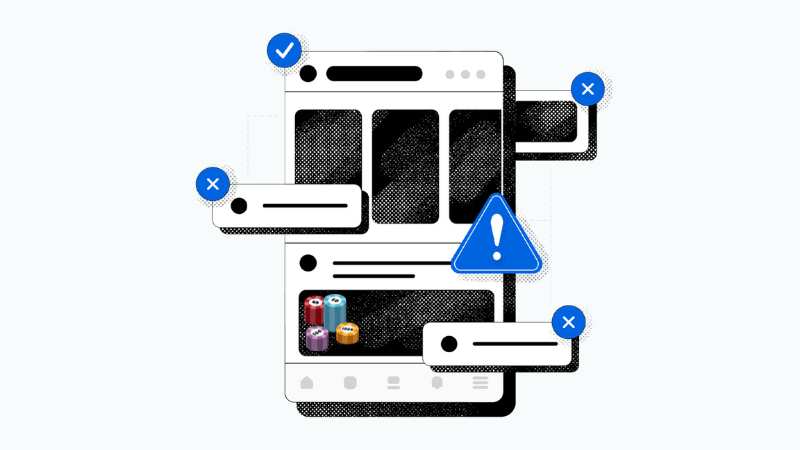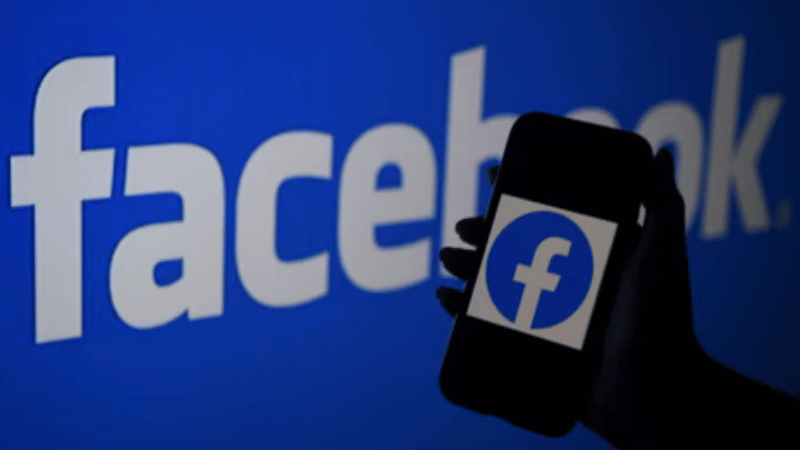Many advertisers deploying campaigns in sensitive verticals often wonder, Is gambling on Facebook illegal, and whether they might be fined or have their accounts locked. The platform’s tightening of the review process makes content related to betting easy to flag, even restricting display, even if the runner attempts to circumvent keywords or change the messaging. Therefore, correctly understanding whether “Is gambling on Facebook illegal?” is necessary to avoid unintended risks, especially for Fan Pages or ad accounts currently in the optimization phase. The article below will provide you with full information to help you answer the question “Is gambling on Facebook illegal?”.
The legal framework surrounding gambling activity on Facebook
Content related to betting always falls into the sensitive zone of the advertising ecosystem. When deploying, advertisers often face the risk of display limitation or account lock if they are unfamiliar with the regulations. Facebook’s internal policy and the legal regulations of each country create a dual management layer, requiring the runner to understand the high-risk points.

Terms that easily land ads in the severe violation category
When mentioning gambling in ad content, Facebook’s algorithm prioritizes a thorough scan of the degree of behavior stimulation, monetary value, and risk nature. Elements such as invitations to participate, references to valuable rewards, or descriptions of the betting process can all cause the ad to be flagged as a violation.
Content related to financial risk or challenging behavior is also classified as sensitive. Not only text content, but suggestive images such as chips, betting tables, or game interfaces also increase the risk of ad lockout.
When these violations are repeated within the same account, the system will evaluate it as intentional behavior, leading to heavier penalties such as Fanpage lock or permanent account restriction.
Why Facebook is tightening content related to betting behavior

Facebook always prioritizes community safety and limits access for audiences easily affected by high-risk services. Betting is considered a behavior that can cause financial and psychological harm and lead to illegal activities in many countries.
Therefore, platforms are forced to review more carefully to prevent users from accessing harmful ad content. At the same time, betting behavior is often difficult to legally verify by region, forcing Facebook to apply stronger filters.
The cross-border nature of the platform also puts pressure on Facebook to maintain its reputation and comply with international law. For this reason, the algorithm is continuously adjusted to minimize campaigns related to gambling, even when the content does not have malicious intent.
How the platform handles accounts suspected of being related to gambling
When the system detects suspicious signals, the account will be put through an automated and manual review process.
Facebook reduces distribution or temporarily pauses ads to check the content. If repeated signs are detected, the platform will request identity verification, Fanpage ownership, or documentation proving the legality of the activity.
In cases where the account has a history of violations or intentionally bypasses policy, the system may apply strong measures such as long-term ad lockout or a complete network ban. For Fanpages containing gambling-related content, Facebook will periodically scan to limit the spread.
This is why runners need to maintain a clean history, clearly separate content, and minimize signals that could be easily misinterpreted by the algorithm. By understanding how the platform reacts, the advertiser will be more proactive in protecting the account and avoiding unnecessary risks.
When is advertising considered an accomplice to gambling activity?
To run stably in the sensitive vertical group, you must understand when the system evaluates an ad as showing signs related to betting behavior. Even if the content does not explicitly state it, the algorithm still analyzes each layer of information to identify the risk. From there, the risk level is classified and flagged at multiple tiers.

Signals that cause the system to flag, even if content does not directly mention gambling
The risk identification system relies on user behavior, image context, keywords, and communication intent. If the creative suggests the feeling of winning prizes, exchanging money for rewards, or emphasizes the winning/losing element, the content is easily considered a lure for gambling.
Descriptions with colors that stimulate quick action also cause the ad to fall into the monitoring list. Unusual interactions, such as a sudden increase in likes, abnormal click-through rates, or a viewer segment heavily inclined toward high-risk financial content, also raise system suspicion.
Types of creatives or landing pages easily deemed dangerous
Creatives with overly bright colors, symbols of spinning wheels, gift boxes, jackpots, scoreboards, or interfaces resembling game portals are often judged as sensitive. If the landing page contains strong call-to-action buttons, transaction methods, or applications for reward exchange, the alert level increases.
Content simulating a game room, betting boards, gift codes, or images of characters promoting participation also causes the system to tighten control. Just a small part suggesting the wrong tone can lead to the entire campaign being temporarily paused for inspection.
Different levels of risk
Risk depends on how you frame the message. The closer the product is to the scope of reward exchange, the higher the risk. Calls to action like “play now,” “claim reward,” or “join today” are often judged more harshly than neutral objectives like “guide,” “information,” or “survey.”
Even with the same visuals, different messages can lead to different review levels. Understanding how the system stratifies risk helps in flexibly choosing the appropriate expression to limit account locks or reduce distribution.
Sanctions and penalties that may occur to advertisers on Facebook
When deploying advertising belonging to the sensitive content group, especially related to gambling, advertisers often face legal risk as well as platform risk. Knowing the sanctions helps you proactively handle situations and avoid chain consequences that could cause significant damage to your account or business.

Forms of handling by authorities in Vietnam
From a domestic legal perspective, advertising acts related to gambling are classified as prohibited content. Based on Clause 2, Article 5, Point a, Clause 2, and Clause 3, Article 33 of Decree 38/2021/NĐ-CP (amended by Decree 128/2022/NĐ-CP), the fine for individuals is between seventy and one hundred million Vietnamese Dong (VND 70,000,000 – VND 100,000,000).
In addition to this amount, the violator must remove all related ad content. In cases where an organization commits similar acts, the fine increases to between one hundred forty and two hundred million Vietnamese Dong (VND 140,000,000 – VND 200,000,000).
It is noteworthy that these fines apply to content that has already run, is currently running, and content about to run but detected by specialized agencies. Therefore, advertisers need to check not only the creative but also control the descriptive information, links, and landing page content.
Any factor showing signs of involvement in organizing betting can be considered a violation. This is also why many industry groups are required to present legal documents when deploying campaigns.
Direct consequences for ad accounts and Business accounts
In addition to sanctions from regulatory bodies, Facebook will proceed with handling upon detecting signs of violation. An ad related to gambling can lead to the account being warned, the Ads Manager being disabled, or the entire Business system being locked.
When the severity of the violation is classified as serious, Facebook may block the right to run ads on all related assets, such as Fanpages, Pixels, and Domains.
The chain effect happens quite quickly. When one account is locked, linked accounts within the Business are also re-evaluated and easily fall into a restricted state. This interrupts all running campaigns, leading to the loss of optimization data and affecting revenue.
Therefore, advertisers need to build an internal review mechanism to detect risks before publishing content and avoid system misidentification.
How advertisers must handle the situation
In the context of this industry being easily scrutinized, many people prioritize use of rental ad accounts at the agency to minimize risk to their primary assets. Rental accounts often have a longer history of activity, a higher trust score, and are accustomed to the review level of campaigns belonging to sensitive groups.
When a creative or landing page needs quick testing, using a rental account helps limit the risk of locking the entire business system. You can scale the budget under control, separate risk, and maintain stability for primary campaigns.
Furthermore, renting accounts from a reputable provider also allows you to receive support for content review, guidance on message adjustment, and handling when abnormal warnings occur. From there, you maintain a stable running pace and avoid disruption to the distribution flow.
The work process after being fined
When regulatory bodies determine signs of violation, they will send a notice requesting the relevant entity to work directly. This process often begins with cross-referencing ad information, inspecting the landing page, and verifying the entity behind the campaign. The advertiser must provide related documentation, including service contracts, partner information, and the reason for ad deployment.
After verification, the authorities will issue a sanction decision with the specified fine amount and require content removal. In many cases, the processing time is not too long, but the advertiser has the obligation to fully comply, even if the ad has stopped running. Non-cooperation or slow content removal may lead to additional penalties being applied.
This process shows the strictness of regulatory bodies toward the gambling industry. Therefore, advertisers need to prepare thoroughly, review content regularly, and clearly understand the potential risks before deploying any campaign.
Frequently Asked Questions
Yes, if the content targets users in Vietnam, regulatory authorities still have the right to penalize, even if the advertiser is registered in another country.
It does not change the legal responsibility; the fine from the regulatory authority still applies normally.